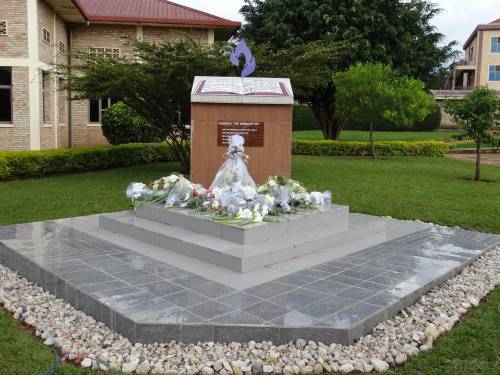A letter from Kay Day serving in Rwanda
June 2017
Write to Kay Day
Individuals: Give to E200502 for Kay Day’s sending and support
Congregations: Give to D507524 for Kay Day’s sending and support
Churches are asked to send donations through your congregation’s normal receiving site (this is usually your presbytery).
Dear Family and Friends,
Greetings from Rwanda. We are in the midst of our hundred days of remembering, which is a commemoration each year of the Genocide of 1994. Beyond the seven days of intense observations from April 7 to 14, there are various services held throughout the country at sites where killings took place or where people were captured and carried away. Each year, the Protestant University of Rwanda (PUR), as we are now known since we were granted university status in April (formerly the Protestant Institute of Arts and Social Sciences, PIASS), holds an event remembering the dean of the faculty of theology, his wife and four children, and four students who were abducted from the campus and never seen again.
These remembrances are emotionally difficult, especially for survivors. Each year a different student who is a survivor is asked to speak, the families of the victims are invited and one representative of the family group speaks. Flowers are placed at the campus memorial. This is the 23rd year after the genocide and some begin to question the benefit of such remembrances. Would it not be better to just move forward? Is this remembering not tearing open wounds that are beginning to heal? I know the importance of remembering the past, but I confess that I have had some of these thoughts as I have heard the speeches and witnessed the sobbing pain of this remembering. But this year the PUR Peace Club presented a short drama depicting that pain of remembering and ended with the following poem by Floriane Niyunge. It put the events into perspective for me.
WE REMEMBER
We remember you for what you have been to us.
We remember your life;
Your achievements, projects and dreams.
We remember so that we keep your memory alive;
So that we give meaning and life to your memory.
We remember so that we never fall into the trap of history
And murder you a second time.
We remember so that genocide never happens again.
Despite our traumas from the past, despite the pains and scars we carry with us
We now exist for one another.
We are now living and hoping to continue living like normal people.
We will live your dreams and keep you alive.
Ikivi cyanyu tuzacyusa!
We remember together as humans!
We remember for the future!
It is when we remember for the future that memory is vitally important, so that we do not repeat the past, so that we learn from the past, so that we give meaning to the future. That is the core of God telling the children of Israel to remember when they left Egypt and came to the Promised Land. It is the core of our remembering with holidays like Memorial Day, the Fourth of July, September 11, and Veteran’s Day in the U.S. This helped me to see remembering in a deeper way.
This invites us to a time of reflection. What are the pains of our past that we remember? Will we allow God to use our remembering to bring us to a brighter future? Who from our past sacrificed to give us a future and hope? These are points of consideration for all of us as we work through the conflicts of the present and as we look to the future.
As I remember, I thank you for supporting me and enabling me to be here and to walk with my Rwandan friends in times of remembering. I could not be here without your prayers and your financial support. I ask, please, that you continue that support as generously as you have in the past. It is vital to my serving here. Please share with others what God is doing here, that they might join us. Thank you and God bless you as you give to God’s work here in Rwanda.
Yours in Christ’s love,
Kay (Cathie to the family)
![]() You may freely reuse and distribute this article in its entirety for non-commercial purposes in any medium. Please include author attribution, photography credits, and a link to the original article. This work is licensed under a Creative Commons Attribution-NonCommercial-NoDeratives 4.0 International License.
You may freely reuse and distribute this article in its entirety for non-commercial purposes in any medium. Please include author attribution, photography credits, and a link to the original article. This work is licensed under a Creative Commons Attribution-NonCommercial-NoDeratives 4.0 International License.
